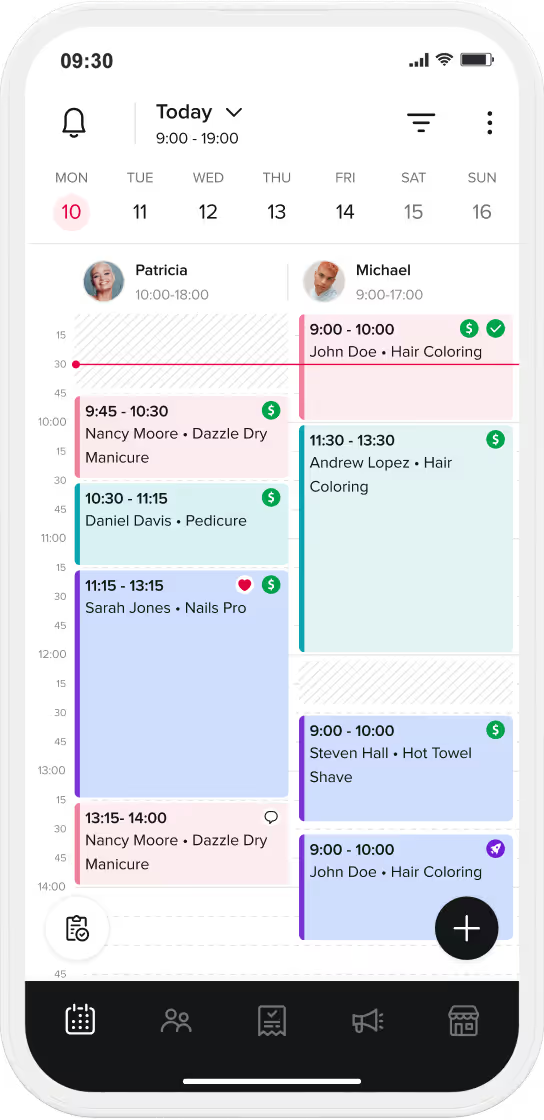

Running a successful business during COVID-19 is an uphill battle that poses a host of new challenges. Although there’s a wide variety of different ways to drive sales, cross-selling is one successful approach that Booksy professionals can use to get back on their feet.
In simple terms, cross-selling or cross-booking is a sales technique where a business entices customers to buy more services or high priced items to generate more revenue. While cross-selling usually involves marketing more profitable products, it can also mean exposing clients to additional services.
Inside a barbershop, it could mean encouraging customers to schedule a haircut and beard grooming session, along with a facial designed just for men. For a salon, it translates to getting clients to book a hair appointment, along with nail or skin care services and waxing.
The long list of different ways to apply this approach goes on and on. But for a Chicago, Illinois based business owner named Luchy Manjarres Cohen, cross-selling was once a concept. Today, it’s the number one strategy that she employs inside her popular boutique called Sorelle.
Luchy runs one of the more successful Booksy businesses in the Chicagoland area. Read on to learn why this salon owner swears by cross selling and recommends that other industry experts take advantage of this strategy to market themselves and their services, during this trying time.
LQT2v95o-dM
Sorelle is located in a vibrant neighborhood called Wicker Park, which rests on the Northwest Side of Chicago. The area is home to hip crowds, quirky shops, minimalist cafes, specialty grocery stores, and chic fashion boutiques.
Luchy opened her salon after spending years working as a mental health professional. Her time in that field taught her that people need a space, where they can relax and feel pampered. And she also believed that people would appreciate their relaxation sessions the most, if they could experience a number of different beauty treatments in one visit.
Today, Sorelle offers full body waxing services for men and women; eyebrow shaping and tinting; dipping powder manicure treatments on natural nails, nail extensions, and spa pedicures; a variety of skin services, such as facials and advanced skincare treatments; eyelash extensions and lifts; and a long list of hair styling services, including creative cuts, coloring, as well as hair extensions.
Just as Luchy theorized almost a decade ago, her customers appreciate the convenience, since it's much easier for them to get all of their needs met in one place.
But even more importantly, Luchy has the ability to earn a healthy profit whenever she invites someone into her salon. Part of the reason this strategy works so well is because it’s easier for her to sell to an existing client, instead of always striving to bring in new clientele.
“Cross-booking has always been at the core of our business. We are a full service, one stop shop. If we don’t do that—we are losing our core, our identity,” she said. “For us, it’s very important to be a one stop shop. We sell the convenience of having both beauty and fashion services under one roof.”
When properly executed, cross selling services lets clients get additional peace of mind, while maximizing their time. “We value convenience, we value time,” Luchy added.


Even though the challenges of COVID-19 made it tough to move forward, this business owner and entrepreneur, who had already invested ten years into the salon industry, refused to let the pandemic permanently close her doors. Instead, she reapplied the tried and true method of crossselling, so her business could continue to thrive.
When Luchy reopened her salon doors, it was more important than ever for each of her staffers to be well-informed about all of the different services inside her salon. Employing industry experts who can answer questions about every service makes it easier for her to spread the word about booking multiple treatments.
Before the pandemic, Luchy encouraged her staffers to experience the different treatments available at the salon. This lets them share first-hand experience, whenever a customer asks about different services that her salon offers.
Another important strategy that Luchy recommends is to make sure different treatments are always visible. While COVID-19 may limit the amount of different stations that are available inside the shop, it still lets people remain within six feet of one another. And that's a safe distance for people to view other services being performed.
Let them see the manicure or pedicure treatment taking place across the room. Give people the opportunity to watch a staffer apply makeup services. This strategy lets clients witness different services, which encourages cross-selling.
Finally, Luchy recommends that fellow business owners think outside of the box. She suggests that industry experts draw upon all of their talents or related interests. For Luchy, that means bringing her appreciation for high-end fashion into the salon. Customers are welcome to buy original clothing that Luchy creates and sells as merchandise.

To Luchy, cross selling isn’t an approach that should be limited to the salon industry. Instead, she believes that all beauty and wellness professionals should consider this strategy.
For instance, she encourages male grooming experts to try pampering guys more often. Detailed eyebrow maintenance is becoming more of a trend for men. And women aren’t the only clients who feel better and more confident after a black mask treatment.
One more reason that cross selling helps drive sales is that clients appreciate spending a little extra time relaxing in a salon chair. Offering more services gives them another excuse to unwind in a place that already feels like home.
“I think everyone loves it, because the more time that a person spends in the shop, there more chances they have to create a connection,” Luchy said. “The feedback from clients is they love it. And they look forward to telling us what is going on in their lives. So, for them it’s just coming in to chitchat with their friends.”



